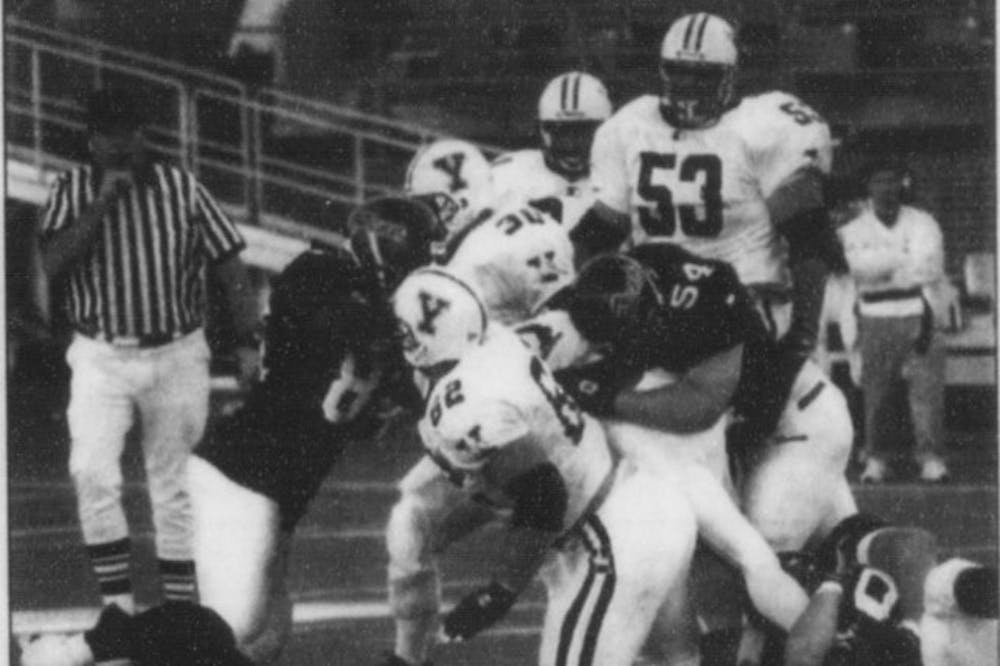It’s not every day that you see a Penn alumnus have the opportunity to play in an NFL game — let alone to win a Super Bowl.
Justin Watson became the first Quaker in years to win a Super Bowl ring after the Tampa Bay Buccaneers took down the Kansas City Chiefs in Super Bowl LV. Jim Finn, a fullback for the Quakers from 1995-99, won a Super Bowl with the New York Giants in 2007, but his road to a ring was the more unconventional one of the two.
Finn attended Bergen Catholic High School, a perennial powerhouse in New Jersey football. As a multi-sport athlete, he was an All-State selection in both football and wrestling before committing to continue his football career at Penn.
Finn had an incredibly successful career as a Quaker, and his statistics still stand on the top of Penn’s record books. As a fullback, Finn rushed for 2,227 yards during his four-year career at Penn. This total was good for the fourth most in Red and Blue history. Finn also accounted for 180 points as a Quaker, which places him at fifth all-time in Penn history.
Aside from the impressive statistics, Finn earned his fair share of accolades during his time at Penn. In his final two years with the Red and Blue, Finn was an All-Ivy selection and was also named Ivy League Player of the Year. These accolades were critical in getting Finn noticed by NFL scouts, which ultimately allowed him to win a Super Bowl as part of the 2007 New York Giants.
Finn was selected as the last pick of the seventh round in the 1999 NFL Draft by the Chicago Bears, earning the name “Mr. Irrelevant,” a moniker given to the player selected with the final pick in the NFL Draft. While the name is purely driven by satirical purposes, it did give Finn some extra notoriety around the league in the time directly after the NFL Draft, as he headed into his first-ever NFL training camp.
Similar to many late round picks, Finn had to fight for a roster spot as a rookie. Finn missed the final cut in his first camp, but was retained on the Bears' practice squad and spent most of the season there. After his rookie season, Finn was signed by the Indianapolis Colts and spent the seasons from 2000-2003 on their active roster.
While Finn’s touches were limited over the course of his tenure on the Colts, he showed enough as a blocker to be coveted by a number of other teams in free agency, including the New York Giants.
RELATED:
A look at the quarterbacks on Penn's roster now with Glover gone
What if? NFL legend Gale Sayers' close call with becoming Penn's Athletics Director
After the 2003 NFL season, Finn signed with the New York Giants, where he would ultimately finish out his career. Finn was utilized far more under coach Tom Coughlin in New York, which was a more run-centric offense.
Ironically, the majority of Finn’s success as a Giant came as a receiver out of the backfield. He had 42 receptions for 325 yards. Over the next few seasons, Finn’s availability was often in question as he battled a number of injuries.
Despite the injuries Finn had to deal with, he was able to play in all 16 games of the regular season in 2005, notching 13 starts. Finn was a great lead blocker for Tiki Barber in the 2005 season, in which the running back set the franchise record for rushing yards in a single season with 1,860.
2006 was a rough season for Finn, as he was on and off the field with injury after injury. By the time the 2007 season came, Finn was so banged up that he was placed on the injured reserve and ultimately spent the entirety of the season on that list.
2007 was a very successful season for the Giants, culminating in an upset over the New England Patriots in Super Bowl XLII. Even though Finn didn’t get to play in the game, the foundation Finn helped lay in years prior and the leadership Finn provided in the locker room was a huge influence on the success of the organization.
After several years of success on the field, Finn's one year off finally brought him a Super Bowl ring. However, his accumulation of injuries — especially in the latter portion of his career — led him to retire following the 2007 season.
It may have been a strange road to get there, but Jim Finn’s NFL career ended in a way that is as good as it gets.









